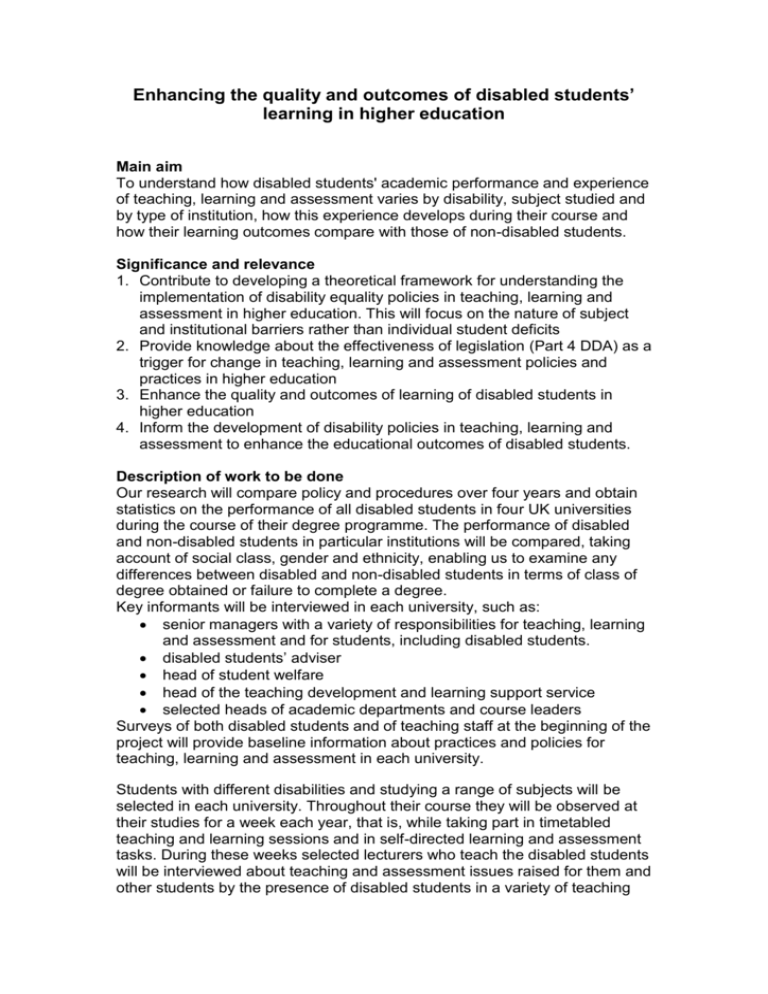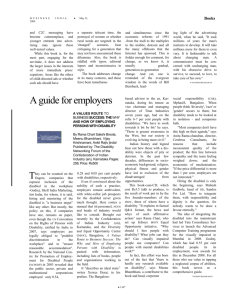Enhancing the quality and outcomes of disabled students` learning
advertisement

Enhancing the quality and outcomes of disabled students’ learning in higher education Main aim To understand how disabled students' academic performance and experience of teaching, learning and assessment varies by disability, subject studied and by type of institution, how this experience develops during their course and how their learning outcomes compare with those of non-disabled students. Significance and relevance 1. Contribute to developing a theoretical framework for understanding the implementation of disability equality policies in teaching, learning and assessment in higher education. This will focus on the nature of subject and institutional barriers rather than individual student deficits 2. Provide knowledge about the effectiveness of legislation (Part 4 DDA) as a trigger for change in teaching, learning and assessment policies and practices in higher education 3. Enhance the quality and outcomes of learning of disabled students in higher education 4. Inform the development of disability policies in teaching, learning and assessment to enhance the educational outcomes of disabled students. Description of work to be done Our research will compare policy and procedures over four years and obtain statistics on the performance of all disabled students in four UK universities during the course of their degree programme. The performance of disabled and non-disabled students in particular institutions will be compared, taking account of social class, gender and ethnicity, enabling us to examine any differences between disabled and non-disabled students in terms of class of degree obtained or failure to complete a degree. Key informants will be interviewed in each university, such as: senior managers with a variety of responsibilities for teaching, learning and assessment and for students, including disabled students. disabled students’ adviser head of student welfare head of the teaching development and learning support service selected heads of academic departments and course leaders Surveys of both disabled students and of teaching staff at the beginning of the project will provide baseline information about practices and policies for teaching, learning and assessment in each university. Students with different disabilities and studying a range of subjects will be selected in each university. Throughout their course they will be observed at their studies for a week each year, that is, while taking part in timetabled teaching and learning sessions and in self-directed learning and assessment tasks. During these weeks selected lecturers who teach the disabled students will be interviewed about teaching and assessment issues raised for them and other students by the presence of disabled students in a variety of teaching and learning environments (e.g. mass lectures, groupwork, seminars, workshops, fieldwork, laboratory sessions). This material will be used to identify the nature of barriers in teaching, learning and assessment policies and practices as well as those policies and practices which are enabling. Each university will designate a Project Action Committee (PAC) whose members will include key personnel with institutional responsibility for teaching, learning and assessment and for disability issues. One person from each group will serve as an advisor to the research team. The team will make regular reports to the PAC and will receive information about policy and practice changes within the university. This sets up a two-way exchange of information about action, so that as well as locating barriers, we shall also document universities’ efforts to remove them and to embed practices that enhance students’ learning. Implications of the findings for the new legal requirements to make anticipatory ‘reasonable adjustments’ will be drawn out. Schedule: Project Milestones Year 2004 Months Activities Key informant interviews 1-6 Key institutional documents √ Survey disabled students √ 2005 7-12 13-18 2006 19-24 25-30 2007 31-36 37-42 43-48 √ √ √ √ Write report √ √ √ √ Lecturer interviews re tla Dissemination √ √ √ √ √ √ √ only Disabled student interviews re tla Glasgow only √ Glasgow Performance data √ √ √ Articles Team meetings √ Analysis Web-site Prepare datasets for archive √ √ √ √ √ √ √ √ √ √ √ √ √ √ √ √ √ √ √ √ √ √ √ √ √ √ √ √ The Team Mary Fuller: Professor of Education, University of Gloucestershire Has been a researcher at Bath and Bristol universites and taught at Bulmershe College of Higher Education and Reading and Oxford universities. Previous research projects include the impact of traditional and sandwich courses on career choices of science and engineering students; development of adolescent ethnic and gender identities; development of multiracial education policies in Canada; teaching science in areas of social deprivation; and gifted pupils. Her PhD on social justice and education involved a year’s ethnographic fieldwork in a multiracial school in Brent. Mick Healey: Professor of Geography, University of Gloucestershire Director of the Geography Discipline Network and Senior Advisor to the LTSN National Subject Centre for Geography, Earth and Environmental Sciences (GEES). Taught at Coventry University for 20 years. He has written about economic geography and learning and teaching in higher education. He has directed 12 teaching and learning research project, including two on disability. He was an Advisor to the HEFCE Mapping Disability project. Current research interests are: developing the scholarship of learning and teaching; linking research and teaching; an international study of Kolb's learning styles and concepts of learning among geographers; developing an inclusive curriculum for disabled students; and raising pedagogic research capacity. Alan Hurst: Professor of Education, University of Central Lancashire His teaching focuses on special education, disability and the sociology of education. He is a trustee and past Chair of Skill: National Bureau for Students with Disabilities and has convened its Higher Education Working Party for many years. He has worked with the funding councils in England and Wales, the QAA for Higher Education, the ILT and the Learning and Teaching Subject Network (LTSN) Generic Centre to develop policy and provision for disabled students, including a close involvement with the Teachability project sponsored by the Scottish HEFC. Current interests: promoting inclusive learning and teaching; evaluating the quality of policy and provision. Sheila Riddell: Professor of Social Policy (Disability Studies), Glasgow University Was as an English teacher in a comprehensive school before doing a PhD in gender and subject choice at Bristol University. Worked on projects on special educational needs; disability; and gender and education policy, including an investigation of the transitional experiences of young people with recorded special educational needs. Has a remit to develop teaching and research in social aspects of disability. The Strathclyde Centre for Disability Research (SCDR), established in 1997, undertakes inter-disciplinary research in the field of disability, with particular focus on education and training, employment and health and social care. Terry Wareham: Director, Centre for the Enhancement of Learning and Teaching, Lancaster University Lectured on post-compulsory teaching development programmes and was staff development officer at Milton Keynes College before moving to Lancaster. Leads and supports developments in student learning, teaching development, learning technologies and wider staff development; responsible for co-ordinating Lancaster’s learning, teaching and assessment strategy; member of its committee on Equal Opportunities and Teaching and Learning. She has contributed to the Geography Development Network projects in the areas of small group teaching, key skills for students and a web resource for fieldwork with disabled students. She wrote and co-edited Failing Students in Higher Education. Has interests in how higher education teachers develop understanding and skills in teaching their students, particularly how they respond to students’ barriers to learning. Contact details Professor Mary Fuller School of Education University of Gloucestershire Francis Close Hall Campus Cheltenham GL50 4AZ Phone +44 (0)1242 532212 (direct) Fax +44 (0)1242 536262 Email mfuller@glos.ac.uk








